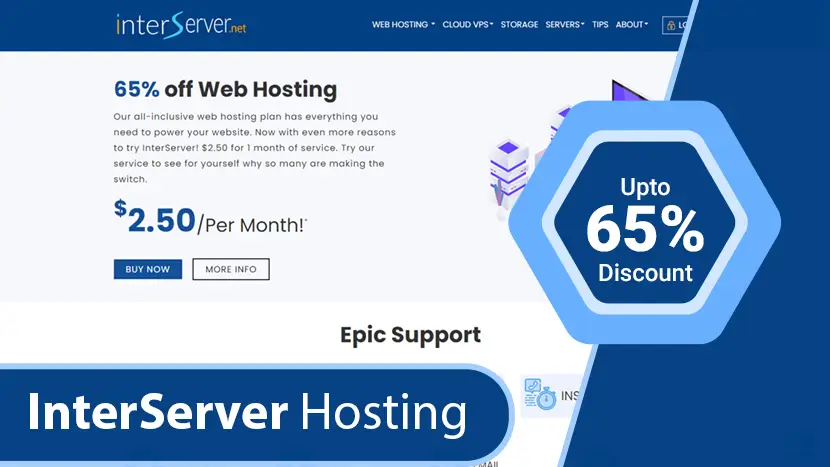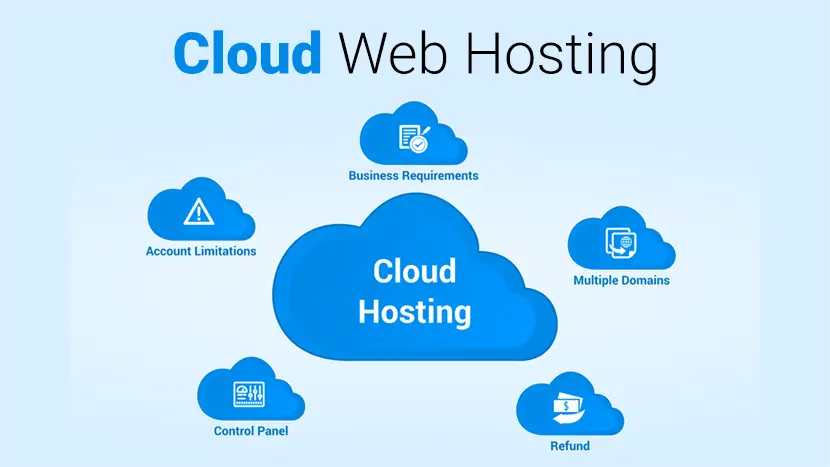InterServer Web Hosting Review - Features, Pros & Cons
Last updated on January 19, 2025 by RGB Web Tech

Namecheap is best known as a domain name registrar, but they also offer cheap web hosting. Before you sign up with them you should read our Namecheap hosting review and find out if their hosting is any good, or if they should stick with domain names. Visit Namecheap.com Most people know of Namecheap as a domain registration and management service, but they also offer web hosting services. Founded in 2000, Namecheap began by offering value-priced domains and excellent customer service. Today, they have over 3 million clients and manage over 11 million domains.
In addition to domains and full web hosting packages, Namecheap sells SSL certificates, privacy protection services, and more. Because Namecheap thinks that an Internet presence for all is a necessity, they provide affordable access to everything you need to run a website. Namecheap’s hosting plans offer fast, reliable service with a 100% uptime guarantee. If you need to build a new site, you can easily do so using one of Namecheap’s many site-building apps. If you have an existing website, Namecheap will move it for you for free. In addition to a solid knowledge base, you can consult if you need help, Namecheap offers 24/7 chat support.
Feature
- Unmetered bandwidth
- Free website builder
- Domain name and privacy protection
- Free automatic SSL installation
- Free Supersonic CDN
- 30-day money-back guarantee
- Free in <24 hours website migration
What are the Pros and Cons of Namecheap?
Is web hosting from Namecheap any good? There are lots of pros and cons to weigh up when considering buying hosting from Namecheap.
Pros
- A well-known brand that has been around for 20 years.
- Cheap domain names.
- Support is of good quality.
- Reliable hosting services.
- The design and interface are very user-friendly.
- Free and fast migration from other hosting providers.
- Backups on a daily basis.
- Choose the largest shared plan and backup twice per day and also weekly.
- Quick registration and setup process.
- Lots of TLDs available with varying extensions.
- No upsells when you sign up.
Cons
- Setting up SSL certificates is difficult and often needs help.
- Some aspects of the dashboard are hard to find.
- No phone support.
Frequently Asked Questions About Namecheap
1. How do I pay for Namecheap hosting?
Namecheap accepts American Express, Mastercard, Visa, PayPal, bitcoin and Dwolla.
2. How do I choose my data center location?
When you order shared or reseller hosting, you’ll see a drop-down list where you can select the location. Right now, there are two choices: UK or US. You can’t select a specific city. All VPS plans are provisioned from its US data centers in Atlanta, GA or Phoenix, AZ. All of its dedicated server plans are set up in Phoenix.
3. What is Supermicro server hardware?
On Namecheap’s dedicated server plans, you’ll notice it advertises Supermicro hardware. These servers are rack mounted units that are designed to offer exceptional uptime and low power draw, which can help them run cooler.
4. Will I get root access with my dedicated server?
Yes, if you select a self-managed. Root access is not available on fully managed dedicated hosting plans.
5. How long does it take to set up my hosting account?
If you buy shared or reseller hosting, it will be automatically activated, and available to use more or less instantly. VPS and dedicated plans are a little different. Namecheap says it may need to contact customers to verify their identity. If this happens, provide the information as quickly as possible to avoid delays. If Namecheap doesn’t need to verify you, it says dedicated hosting accounts will be provisioned the same day, with many being ready within 4 hours. VPS hosting will be activated automatically within 2 hours, unless you’ve ordered full management, which may add a couple of hours onto the setup time.
6. What is the Namecheap uptime guarantee?
Namecheap promises 100% uptime on shared hosting accounts, and most dedicated server accounts. If it fails to achieve this, you will receive a credit on your account.
7. Should I choose WhoisGuard?
WhoisGuard hides your personal information from the global Whois database. This option is only available on some types of domains, so you may not see it in your cart. WhoisGuard may help to prevent spam, and it makes it more difficult for people to figure out who owns a domain. If you plan to sell your domain name later, you may wish to leave your contact information visible. Additionally, businesses should not generally hide their contact information, as it can make them look shady.
8. Should I choose PremiumDNS?
PremiumDNS is a Namecheap service that guarantees 100% uptime for your DNS information. This essentially means that your website is guaranteed to resolve. Your DNS is served from 17 different locations around the world, and the service also includes DNS DDoS protection. In general, only business users need worry about PremiumDNS. It’s inexpensive, but unless your site is mission critical, it may be unnecessary. Consider how important DNS uptime is for your website before you subscribe.
9. What are the types of web hosting?
This answer will be different for everyone. It depends on the type of website you have, the resources you need, your budget, and traffic.
We gave our top recommendation for each category in this guide, so that’s the best place for you to start your search.
Once you know what you need, you can narrow your options. To figure out what category you fall in, here’s a quick recap of the different hosting types and who they are for:
- Shared Hosting — Shared hosting is the most cost-effective plan for entry-level websites.
- VPS Hosting — VPS hosting is for websites that have outgrown shared hosting.
- WordPress Hosting — WordPress hosting optimized for WordPress sites.
- Dedicated Hosting — Dedicated hosting is Enterprise-level servers for large websites.
- Cloud Hosting — Cloud hosting is best for websites that are growing rapidly.
- Reseller Hosting — Reseller hosting is for agencies, web developers, and web designers.
- Managed Hosting — Managed hosting is an IT hosting model in which the client leases servers or cloud computing resources.
- Colocation Hosting — Colocation hosting is where you rent space for your IT hardware at a 3rd party provider’s data center facility.
- Self Service Hosting — Self hosting is a form of running your own website or application by setting up a server and network yourself.
- Cluster Hosting — A cluster hosting is a host that is configured to take over the role of another host server within a cluster.
Alternatives - Web Hosting Providers
If you want to explore more web hosting plans, here is some web hosting services provider companies as below:
Read More : You can explore here 30+ Best Web Hosting and Domain name Providers 2023
Video - Best Web Hosting For Small Business
Affordable Website Hosting for your domainIf you found this article helpful, we encourage you to share it on your social media platforms—because sharing is caring! For more information about article submissions on our website, feel free to reach out to us via email.
Send an emailWritten by RGB Web Tech
Latest Technology Trends
Latest technology trends shaping the future, including AI advancements, blockchain innovation, 5G connectivity, IoT integration, and sustainable tech solutions. Explore breakthroughs in quantum computing, cybersecurity, augmented reality, and edge computing. Stay ahead with insights into transformative technologies driving innovation across industries and revolutionizing how we live, work, and connect.
What is Cloud Web Hosting?
Last updated on January 19, 2025 by RGB Web Tech

Cloud hosting is a type of web hosting which uses multiple different servers to balance the load and maximize uptime. Instead of using a single server, your website can tap into a “cluster” that uses resources from a centralized pool. This means that even if one server fails, another kicks in to keep everything running.
Visualize the cloud as a web of different computers which are all interconnected. As more machines are hooked up to the network, more resources are added to the overall cloud.
With cloud hosting, you get a part of the so-called cloud cluster. As opposed to traditional web hosting, where you get a certain amount of space from a single server.
Advantages of Cloud Hosting
There are many advantages of using cloud hosting over shared, VPS, or Dedicated hosting.
- Cost-Effective : One of the biggest reasons why businesses are switching to cloud hosting is because it is more cost-effective than the technology that runs on-premise. With traditional hosting, companies would have to spend money on disks or other storage devices and an IT team to look after these devices. But, with cloud hosting, you simply need to pay the vendor from which you are buying the resources. This saves resources, money, and time for the company. We can all agree on how important that is.
- Easy to Implement : When hosting on the cloud, businesses get to hold on to the same business processes and applications without dealing with the backend features. Since it is managed via the Internet, cloud infrastructure is easily accessible for companies.
- Scalability and Flexibility : A cloud server requires payment for only the used resources. A company does not always stay the same; it has the possibility to expand and shrink. Cloud hosting is also easily scalable which makes it easier for companies to add or remove resources according to their needs. The system grows with the company without extra burden on the company.
- Backup and Disaster Recovery : With every company, there is a risk of data and even financial loss. It is necessary that a company have a disaster recovery program. With cloud hosting, disaster recovery is rarely needed since data backups are automatic. This redundancy in data storage makes the possibility of losing data highly unlikely.
- Accessibility : With the Internet, it is so much easier to access data that is stored on web-based applications from anywhere. Having information that is stored in the cloud makes it much easier for that data to be accessed from anywhere and at any time regardless of the machine. This easy accessibility is one of the biggest advantages of cloud hosting.
Disadvantages of Cloud Hosting
Bandwidth Issue : Cloud hosting depends fully on the Internet. This means that a company needs to always have the Internet that it can rely on and is consistent. The Internet also has to have a fast connection and good bandwidth for the company to be able to take full benefit of the service. If you live in an area that does not have access to a good Internet connection, cloud hosting might turn out to be less fruitful for you.
Limited Control : The servers that host the cloud services are managed by the service providers. The providers are also the ones who own these servers. This makes it difficult for companies using these services to have the type of control that they want over their infrastructure.
Privacy: One of the biggest issues of Cloud hosting could be security issues that can arise if a person without some kind of technical knowledge is trying to use the service. You need technical assistance to benefit from the service. Another reason for security issues could arise from using a service that requires companies to share resources.
Vulnerable to Attacks: The biggest problem when using a web-based application or any kind of web-based service is that the Internet is filled with people who are looking to profit off of someone else’s loss. It is not unusual for a web-based service to get hacked or have a data breach.
When using a cloud hosting service, it is important to note that there are several other companies using the same service from the same vendor as you. This can result in information theft either via hackers or via a company that is in competition with your company. Even though security measures are applied in the cloud, the risk of attacks is something to consider before using this type of service.
Downtime : One of the biggest potential downsides to using a Cloud hosting service is downtime. The service providers, the vendors, can also face technical difficulties on their side. This could be power loss or faulty internet connections, maintenance of data centers causing them to go out of service for some time.
Conclusion : Just like with everything else, cloud hosting might not be the best option for every business. With the growing use of the Internet for almost everything, it is probably best to stay up to date with current technologies so that you are not left behind on progress. It is important to note that the advantages outweigh the disadvantages of cloud hosting but it might not be a necessity for everyone.
List of Cloud Based Web Hosting Service Providers:
Read More : You can explore here 30+ Best Web Hosting Providers 2023
Video - Best Web Hosting For Small Business
Affordable Website Hosting for your domainIf you found this article helpful, we encourage you to share it on your social media platforms—because sharing is caring! For more information about article submissions on our website, feel free to reach out to us via email.
Send an emailWritten by RGB Web Tech
Latest Technology Trends
Latest technology trends shaping the future, including AI advancements, blockchain innovation, 5G connectivity, IoT integration, and sustainable tech solutions. Explore breakthroughs in quantum computing, cybersecurity, augmented reality, and edge computing. Stay ahead with insights into transformative technologies driving innovation across industries and revolutionizing how we live, work, and connect.






